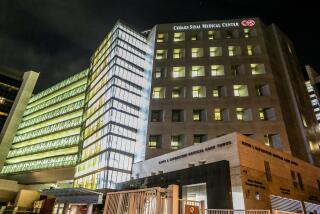Troubling Record for Anti-Aging Doctors
- Share via
One reason why mainstream doctors who study aging have been skeptical of the American Academy of Anti-Aging Medicine is that they believe the group’s physician admission standards are not stringent enough.
A review by The Times of the 50 California doctors who are academy members lends some credence to that criticism. As of late April, 12 of the 50 doctors listed in the A4M’s print and Internet directories have been disciplined at least once by the state medical board, according to board records.
For the record:
12:00 a.m. May 15, 2000 For the Record
Los Angeles Times Monday May 15, 2000 Home Edition Health Part S Page 3 View Desk 2 inches; 67 words Type of Material: Correction
Edmund Chein--A May 8 article in Health about Dr. Edmund Chein should have stated that the California Medical Board placed him on probation in 1995 for false advertising and for failing to obtain a fictitious-name permit. Although the Medical Board accused Chein of falsely claiming to be a graduate of Cornell University Medical School, he did not admit to that charge in his settlement with the state. Chein denies having ever claimed to be a graduate of Cornell’s medical school.
Those 12 doctors represent nearly 25% of the anti-aging doctors in California listed by the academy. By contrast, only 2% to 3% of U.S. doctors have been disciplined by state medical boards, according to Public Citizen, a Washington, D.C., consumer group that tracks state disciplinary actions. California A4M practitioners have been disciplined on grounds ranging from practicing under a false name to drug addiction and botched surgeries; from insurance fraud to misdiagnosis, and other acts of gross negligence and incompetence.
The case of Edmund Chein of Palm Springs illustrates the problems with some anti-aging doctors in California. In January, the state revoked Chein’s license for misdiagnosis, incompetence and false statements regarding hormone replacement therapy, among other violations in the treatment of a patient at his Life Extension Institute. Chein began administering hormone replacement therapy in 1994 and has boasted of treating 800 patients, including some 300 medical doctors. His Life Extension Institute was one of the first to offer total hormone replacement, combining growth hormone, testosterone, DHEA and melatonin, among others.
*
In March 1995, according to state medical board records, Chein began hormone replacement therapy on a 42-year-old woman he wrongly diagnosed as deficient in growth hormone, DHEA and testosterone. Chein failed to perform the appropriate tests to make such a diagnosis, the state board concluded. He prescribed hormones without good medical reason and then failed to monitor the patient for side effects, or at least to document his follow-up.
That wasn’t all. Chein’s office distributed an article titled “The NIA’s Position on Growth Hormone Replacement Therapy in Adults,” the state board found, which claimed that the National Institute on Aging had defined an optimal dose of HGH for hormone replacement in older people.
In fact, the NIA has issued stern cautions against hormone replacement therapy in healthy adults and defined no such dosage.
According to the board’s complaint, Chein also encouraged people on his Internet site to fill out a pre-printed form, to be signed by him, requesting laboratory tests of human growth hormone, DHEA and testosterone, among other things. State law requires doctors to see a patient in person before ordering tests.
Revocation of a license is the most severe sanction available to the medical board, according to officials.
Chein, who is not currently practicing medicine, is appealing the board’s decision. He did not return several phone calls to his office.
Phil Boesch, a Los Angeles lawyer who is representing Chein in the medical board case, says his client is being unfairly singled out by state regulators.
“The medical board wants to establish traditional endocrinology as the only standard of care because it disapproves of prescribing growth hormone for the effects of aging,” he says. “The problem with that standard is that it is not consistent with current practice. There are many doctors out there doing this.”
*
At the time the state revoked Chein’s license, he was completing a five-year probationary period for lying under oath about his medical credentials. He claimed to be a graduate of the Cornell University Medical School; in fact, he received a degree in physical medicine from American University of the Caribbean in Montserrat.
“The board had been watching Chein for five years during the probation,” Boesch says, “and they had no complaints, nothing. Then they picked out one patient as typical.” That patient wasn’t typical, Boesch says; her body was circulating very low levels of growth hormone.
Boesch also disputes some of the board’s other findings. He said it is not negligent to allow patients to print out signed test requests from the Internet: It’s a convenience giving people access to the results of their medical tests. And the charges of false advertising are too minor to merit taking away a doctor’s license, he says.
Ronald Klatz, president of the A4M, declined to discuss Chein’s case, other than to say that Chein is no longer an active member of the academy.
“When you are out on the frontier,” Klatz says, “you are going to attract some of the very best people, and some who are . . . not the very best. We have had situations where we’ve had to contact people and say, ‘Would you mind affiliating yourself with another organization?’ It is an ongoing process, and I think we are attracting better and better doctors.”
*
For information about a doctor’s medical license in California, contact the California Medical Board at (916) 263-2382. Or check the board’s Web site at https://www.medbd.ca.gov.






